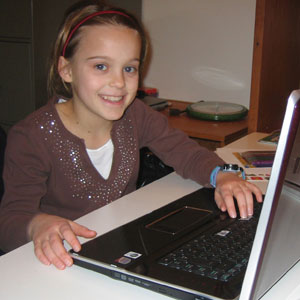 |
| Johanna, wearing an actigraph, does some of the testing in the laboratory between sleep assignments. (Jenn Vriend Photo) |
We spend a third of our lives asleep, but scientists don’t exactly know why.
“There are so many theories out there … but it’s still one of the great unsolved mysteries of science,” says Jenn Vriend, a PhD student in clinical psychology whose research area is sleep. “We do know there are some restorative effects, a need to be refreshed. And we think sleep affects our learning processes and emotions.”
Napoleon claimed he only needed a few hours shut eye a night. And Margaret Thatcher famously boasted that she needed five hours of sleep when she was the prime minister of Britain. But most adults need seven to eight hours of sleep a night and children need more, about 10 to 11 hours a night.
But these days, there is so much to keep kids awake later. There’s just one more video game to play; friends to message or talk to; and please, please, please mom and dad – Lost starts tonight and it won’t be over until 11 p.m.
“These are the kinds of things that are pushing bedtimes back later and later,” says Ms. Vriend, who knows a thing or two about sleep deprivation as the mom of an active 11-month-old baby. “And yet, it’s not like school start times have changed.”
Ms. Vriend is embarking on a study to see how restricting sleep affects the behaviors, cognition and emotions of children aged eight to 12 years old. Can even minor changes in sleep impair a school kid’s learning, memory, attention and concentration? How about their mood? (Ask any parent who has woken up a growly teenager who went to bed late and they’d probably say yes.)
“There are hardly any studies on sleep and learning among children,” she explains. “I realized someone needs to look at this.”
Previous studies of adults have found that sleep deprivation significantly impairs the brain’s “executive control system,” which helps people organize, prioritize, and focus on tasks. But few studies have focused on children. Those few have tended to examine extreme rather than modest sleep deprivation, she says.
For the study, participants wear an actigraph, a device on the wrist like a watch that detects movement. Information gleaned from the actigraph is used to determine the children's sleep schedule— the time they fell asleep, how long they sleep and whether they wake during the night. The information from the actigraph corelates to a sleep diary completed by parents which notes such things as when the lights went out, wake up times and naps.
With the approximate bedtimes and waketimes established over the first week, the participants will then be randomly assigned to either shorten their sleep length by one hour for four nights in a row (bedtime one hour later) or to lengthen their sleep by one hour (bedtime one hour earlier). Each child then switches to the opposite schedule for the third week of the study. After each of the three weeks, children will come to the laboratory to be tested for their ability to think, learn and regulate their emotions.
Ten-year-old Briana McNamara was happy to do her part for science by taking part in the sleep study. “I really liked it and I liked wearing the actigraph,” says the Grade 5 student who normally gets 10 hours of sleep each night. “It felt cool explaining it to everyone.”
And she says she learned something about herself. Going to bed later sometimes gave her a mild headache and made her tired at school. “I found out that if I get more sleep, I wake up feeling much more active,” she says.
Others involved in this study include co-investigator, Fiona Davidson, a masters student at Mount Saint Vincent University, and Ms. Vriend’s supervisors, Penny Corkum and Ben Rusak. The sleep study is supported by a grant from the »ĆÉ«Ö±˛Ą Psychiatry Research Fund and a Student Research Award from the Nova Scotia Health Research Foundation.
Do you know of a child, aged eight to 12, who would be interested in taking part? Ms. Vriend is seeking volunteers for her study, which will involve at-home sleep recording and four visits to the laboratory. If interested or if you’d like more information, please phone Jennifer Vriend at 497-6142 or e-mail at jenn.vriend@dal.ca.
